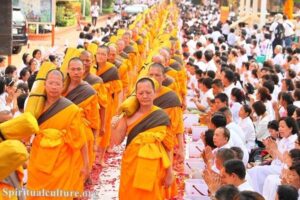It is both a philosophy and a religion that emphasizes living in harmony with the Tao. The Tao, often translated as ‘the way’ or ‘path’, is a fundamental concept in Chinese culture and belief systems, including Confucianism and Buddhism. In Taoism, it refers to the underlying natural order of the universe, which influences everything from the environment to human behavior.
The Taoist Philosophy
The Taoist philosophy is deeply rooted in the understanding of the Tao as the origin and guiding principle of the universe. It is considered to be the source of all creation and the ultimate reality, a force that flows through all life. Taoists believe that by understanding the Tao, one can live a more balanced and fulfilling life.
The Taoist philosophy is often associated with Lao Tzu, an ancient Chinese philosopher, who is traditionally regarded as the founder of Taoism and the author of the Tao Te Ching. This book, translated as ‘The Book of the Way and its Virtue’, is a fundamental text for both philosophical and religious Taoism. It presents various aspects of wisdom, from political advice and moral guidelines to suggestions for leading a simple, peaceful, and balanced life.
Taoist Practices
Taoism encompasses a wide variety of religious, philosophical, and ritualistic practices. These include meditation, martial arts, Feng Shui, fortune-telling, and various forms of physical exercise and healing techniques. Taoists also observe many festivals and rituals, which are often associated with Chinese folk religions.
Among the most well-known Taoist practices is Tai Chi, a form of martial arts that focuses on slow, flowing movements and deep breathing. It is believed to cultivate the life force or ‘Qi’ that flows through the body, promoting physical health and spiritual tranquility.
Taoist Ethics and Morality
Taoism proposes a unique perspective on ethics and morality. Instead of enforcing a rigid set of rules, Taoism encourages individuals to follow the natural flow of the universe or the Tao. This involves living a life of simplicity, honesty, and non-competition. It encourages respect for nature and all forms of life, promoting a sense of compassion and humility.
Taoist Beliefs about Life and Death
Taoism holds a unique view on life and death. It suggests that life and death are merely different phases of the same cycle, with death being a return to the Tao. Many Taoists believe in reincarnation, the concept that the soul is reborn in a new body after death.
Taoism also places a strong emphasis on achieving longevity or even immortality. This is often pursued through various practices such as meditation, alchemy, and diet.
Taoism in the Modern World
Despite its ancient roots, Taoism remains relevant in the modern world. Its teachings about balance, harmony, and simplicity resonate with many people seeking peace in today’s fast-paced and often chaotic society. Taoist practices like Tai Chi and meditation are increasingly popular for their physical and mental health benefits.
Conclusion
Taoism, with its rich history and profound philosophy, continues to shape the lives of millions around the world. Its focus on harmony, balance, and respect for the natural world offers timeless wisdom that is relevant in any era. Whether it’s through the practice of Tai Chi, the study of the Tao Te Ching, or simply embracing a more balanced way of life, the teachings of Taoism offer a path to inner peace and understanding of the universe.





